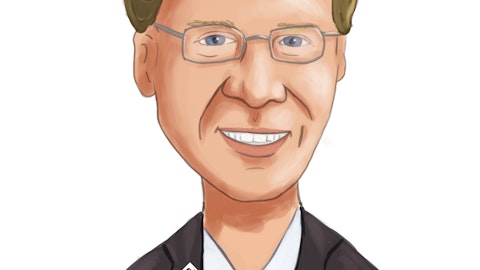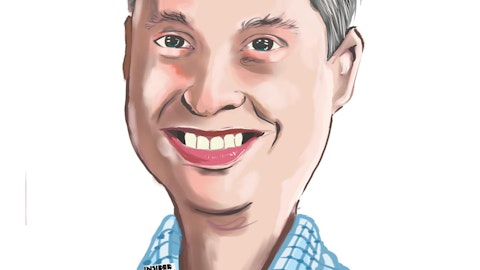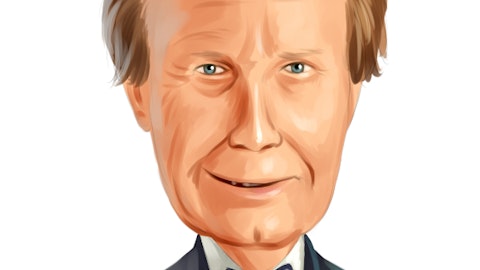Carlos López-AbadÃa: Yes. Let me see what I can — to be precise, we have on Friday, the board meeting to approve the budget. So I don’t want to comment on the specific budget because until we have that approved, there is no budget yet. But let me give you something directional. From a macro environment, I don’t know you probably have your own assumptions, but we are not assuming that the world is going to get less complicated in 2023 than 2022. So in terms of the top line, I personally think that Brazil probably is maybe a better market in 2023. We have behind an election that got a lot of people nervous about what’s going to happen. And as you know, for business sometimes it doesn’t matter who wins the elections and uncertainty is the enemy, right?
So I think that’s behind us. And as Sergio very well commented on, I think the Brazilian Central Bank has taken action earlier than others. Now, it cost us a fortune in terms of cost that we did not anticipate. But for the economy of Brazil, I think it’s good. We expect to see — and we’re seeing it already less inflation for next year than this year. And hopefully that will also allow the government to decrease interest rates and overall a better business environment. But we are not assuming for Brazil or the rest of the world other than, hey, there’s certain uncertainty out there. Having said that, and what do you do in the situation of uncertainty? So we’ve taken a lot of pain this year to make sure that we have a good cost structure, a good — we accelerate efficiencies and that’s the best way you can prepare for uncertainty and potentially also complicated year in the markets.
If you couple that with quite frankly, we’ve seen a stronger sales — And again, we could — I don’t know how many points make a line, right? But we’ve seen good Q2 sales and Q3. And quite frankly, I think we’ve seen — its always tricky with sales because whether you close a contract on January or December, it makes no difference in terms of the revenue for the year, but it makes a difference in terms of the numbers for Q4. But we expect a very strong Q4 also on sales. So if you couple the important sales for us for the year which is at the beginning, right, Q4, Q1 and a better cost structure, we definitely expect a better results for next year. I recognize that’s the direction all the time, but probably that’s the best I can do before we have a budget approved.
Beltran Palazuelo : And maybe the last question, if I may, I think you mentioned in the slide that the last three or five financial costs or abnormal financial costs would be 2023. You mentioned 2024, your cost is — of the hedge is 25 to 30, but I think you do not mention that if things stay how they are that the majority of the principle of the hedged also gets a one-off. So just to get that in place, is there still a possibility that on 2024, $25 milllion, $30 million cost, there might be a one-off as you put in the presentation of the second quarter on page 16?
Carlos López-AbadÃa: So the positives, you can take clearly negative on the hedge is we didn’t expect such a rapid interest rate growth hit us 2022. We’re assuming for 2023 even the forward rates will mean significantly, but beyond 2023 in €˜24, €˜25 and on, the biggest component of the cost of the hedge which is the principle is no more. So regardless of the CBI, regardless of the interest rate, our financial cost drops significantly from that perspective, right, on top of that, interest rates decrease so much better, but regardless, the principle component of the hedge expires in €˜23. So we need to be prudent, we need to be conservative and manage cash flow in €˜23 and things get better after that. Did I — was I correct, Sergio?
Sergio Passos: Yeah, I think — exactly. The 2023, based on the current forward rates is where we are going to have the biggest impact. We are using forward rates, which again, looking at the scenario for Brazil and the inflationary that probably we’re going to see probably half of — or something ranging half of last year, there may be a scenario where later this year, the interest rates go further down so benefit us 24 onwards. But we are not considering that, we are basically using our forward rates.
Carlos López-AbadÃa: We are — it’s always better to prepare for the war. So we assume that 2023 is going to be very high financial cost, but we know for a fact that 24 — that situation significantly improve regardless of the rates.
Beltran Palazuelo : Thank you, Carlos. Just having that, I totally understand. I think you just mentioned that 24 between 25 and 30, when I see page 16 of the Q2 presentation, there’s a one-off positive of 24. So if I do minus 17, minus 14, and I add 24 instead of minus 25 or 30 for 2024, it’s much lower. So my question is there still an expectation than when the hedge matches the principle, there’s still a one-off positive in February, 2024?
Sergio Passos: Yes, Beltran. The thing is that, well, we can take you through all of the details offline. Yes we do. But as foreign exchange changed a lot, remember that in Q3, foreign exchange was in the range of 5.5 and now we are in a different foreign exchange level. The benefit changes a lot. So we can take I think, offline, the details. But yes, we do expect the benefits in €˜24.
Carlos López-AbadÃa : Yes. And I think this is an important point. I think for one of you that, clearly the offer — let me make extensively the offer for anyone that is interested. Unfortunately, the hedge is something that’s taken a big impact, a huge impact on our business and it’s relatively complex, it took me quite a while, and of course most of you will take much less. But to understand and understand what are the variables and you put your own assumptions in terms of interest rates and foreign exchange rates. But Sergio has some very good analysis — sincerely analysis and explanation. So of course — by the way, both Sergio and I are here in Spain today and through the week, so I don’t know if you are in Spain, but happy to share that with you face-to-face and make extensively the offer to anyone, which I think is important to understand these very impactful components.
So anyone that might be interested, Hernan, make sure that we need — schedule a workshop or —




